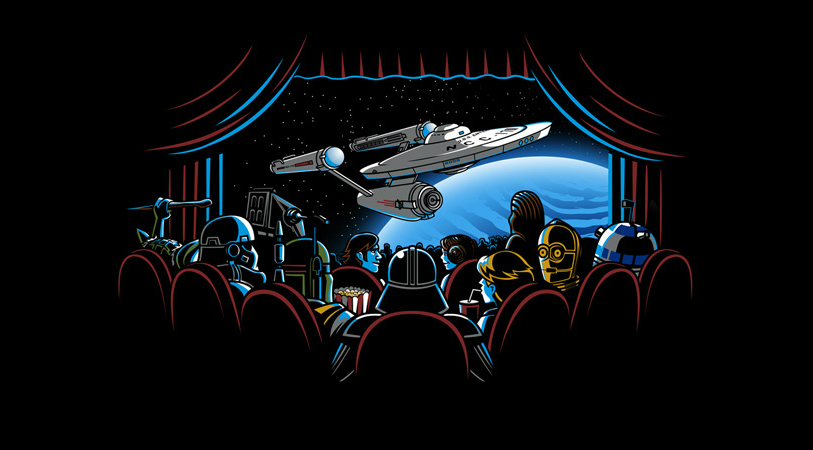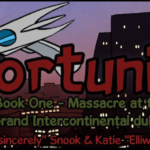
Throughout history, there have been famous rivalries. Whether it involves beverages (Coke versus Pepsi), sports teams (Yankees versus Red Sox) or comic book companies (Marvel versus DC), most people tend to land on either one side or the other in these long-standing debates. However, it may very well be that none of these other noted examples even come close to the debate which has been most frequently cited within science-fiction–and that’s Star Trek versus Star Wars.
Granted, the oft-mentioned rivalry between the two franchises is most likely because, within the realm of the genre, they are considered the two most popular. While Star Trek was the first one to hit airwaves back when the original television series first aired in 1966, it was Star Wars that proved sci-fi had a place in film as well when A New Hope premiered in 1977–and, in turn, paved the way for Trek to return with its own set of movies after the series was cancelled. Both franchises have experienced a recent resurgence in popularity among both new and old fans–while Star Wars looks to expand its universe even further with a string of films, Star Trek has resurrected classic characters in its new movies and is slated to debut a brand-new TV show early next year.
The old saying was that you couldn’t legitimately be a fan of both Star Wars and Star Trek, but more and more there are those who grew up predominantly supporting one franchise who are finding themselves going back and giving the other a chance with a new and different perspective. Personally, Star Wars was my first fandom as a kid; although I didn’t come to Star Trek until later (much, much later), I’m enjoying my experience watching this equally popular franchise as an adult, picking up on some of the major themes and underlying messages that might have been lost on me if I’d watched it when I was younger.
Star Wars, in essence, follows the concept of the hero’s journey, proposed most famously by Joseph Campbell–in it, our protagonist sets out from the normal and perhaps boring existence that he knows to discover a new world of previously unseen sights. After an exciting adventure in which a victory is achieved over conflict, the hero eventually returns to his old world a changed man. Sounds familiar, doesn’t it? In the original trilogy, Luke Skywalker is pretty much the epitome of the hero in this scenario: the Tatooine farmboy who becomes a powerful Jedi Master. In the latest film, The Force Awakens, Finn is the hero found in the most unlikely of places–an Imperial stormtrooper who defects from the predictability of his dictated future and has his eyes opened in the process.
Star Trek, on the other hand, doesn’t necessarily adopt a common narrative template for its main concept but rather expands and builds its stories around a basic human desire: the need to explore, to discover, to learn and grow one’s knowledge and understanding. Back in 1966, space was the undiscovered country; even today, there’s still much that we can’t comprehend about our galaxy and others that may be out there. Star Trek proposes the idea that someday it’ll be we humans who will have the opportunity to travel to those far-off universes instead of telling the tales about the people who already live there. For the crew of the U.S.S. Enterprise led by Captain James T. Kirk, the journey was ongoing, the voyage constant–and there wouldn’t necessarily be the opportunity to return home.
Star Trek is set in a time of overall peace, as was established in later incarnations such as The Next Generation. Problems that face our society today–such as hunger, mass poverty and the need for currency–are complete non-issues by then, as Captain Jean-Luc Picard explains in several episodes. While the United Federation of Planets, a republic consisting of registered and approved members, occasionally faces problems over the years with outside species such as the Klingons, the Romulans and the Cardassians, even the most long-standing conflicts typically end in a treaty agreement or, at the very least, slightly improved relations. In Star Wars, by contrast, the galaxy is in a frequent state of war. The Galactic Empire is depicted as a cruel and merciless dictatorship which exacts its power over the galaxy through fear and brutality–one that a smaller faction referred to as the Rebel Alliance seeks to topple once and for all.
Both franchises, however, use their characters to impart lessons about tolerance and understanding–as well as to remind all of us watching at home that what we have in common with one another matters just as much as what makes us unique. In Star Trek, we see this when characters of different species meet, learn more about each other, become friends or even sometimes fall in love. There are several pairings within the Star Trek universe, romantic or otherwise, that illustrate the importance of accepting another individual regardless of their background–Spock and Uhura, from the recent “Kelvin universe” set of movies, or Odo and Quark’s hilarious friendship on Deep Space Nine. In Star Wars, the concept of unity among individuals is represented by the Force, the ubiquitous power that resides in and links all life forms–which can also be used for good or evil, depending on the individual. As the character of Anakin Skywalker demonstrates, however, no matter how long someone might have been on the Dark Side, it’s never too late for them to come back to the light.
In spite of the fact that Star Trek and Star Wars have been pitted against each other since their respective inceptions, there are certainly similar aspects to both franchises, common threads between the galaxy far, far away and the final frontier of space. In the same vein, there are also factors that differentiate the two from one another, but they both bring essential perspectives to the increasingly diverse genre of science fiction. Star Trek leaves a fan with some takeaways that they might not necessarily be able to get from Star Wars–and vice versa–but they’re both equally important for anyone who calls themselves a sci-fi geek to absorb.



